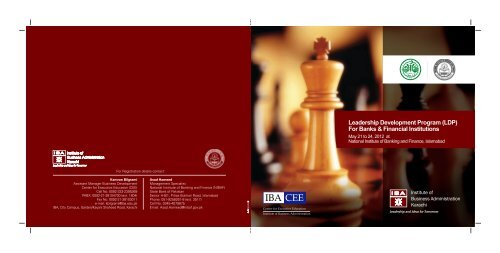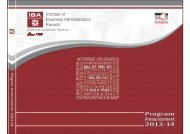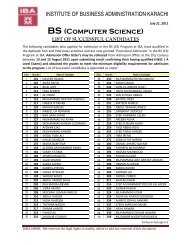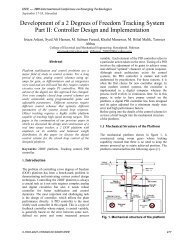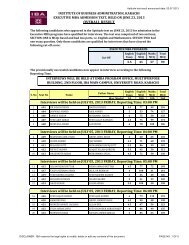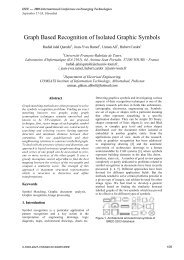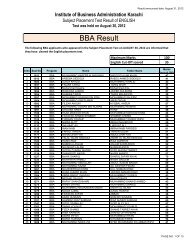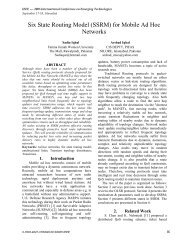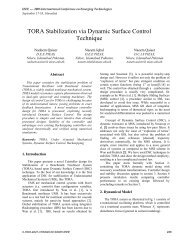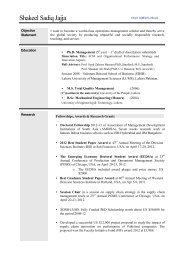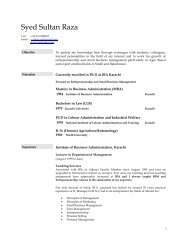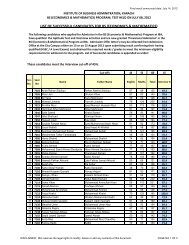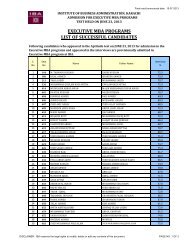Leadership Development Program (LDP) For Banks & Financial ...
Leadership Development Program (LDP) For Banks & Financial ...
Leadership Development Program (LDP) For Banks & Financial ...
Create successful ePaper yourself
Turn your PDF publications into a flip-book with our unique Google optimized e-Paper software.
<strong>Leadership</strong> <strong>Development</strong> <strong>Program</strong> (<strong>LDP</strong>)<strong>For</strong> <strong>Banks</strong> & <strong>Financial</strong> InstitutionsMay 21 to 24, 2012 atNational Institute of Banking and Finance, Islamabad<strong>For</strong> Registration details contact:Kamran BilgramiAssistant Manager Business <strong>Development</strong>Center for Executive Education (CEE)Cell No: 0092-333-2395369PABX: 0092-21-38104700 (ext. 1804)Fax No. 0092-21-38103011e-mail: kbilgrami@iba.edu.pkIBA, City Campus, Garden/Kayani Shaheed Road, KarachiAsad HameedManagement SpecialistNational Institute of Banking and Finance (NIBAF)State Bank of PakistanSector H-8/1, Pitras Bokhari Road, IslamabadPhone: 051-9258261-8 (ext. 3517)Cell No. 0345-4079875Email: Asad.Hameed@nibaf.gov.pkInstitute ofBusiness AdministrationKarachi<strong>Leadership</strong> and Ideas for Tomorrow
<strong>Program</strong> OverviewIn today’s banking and financial world the ability to deal with complexity, provide innovative business solutions and inspiresubordinates and team members are the key to success. Today’s successful leaders are characterized by theirability to identify new customer value proposition, built new business models and shift the business boundaries.Releasing this need, National Institute of Banking and Finance (NIBAF) is joining hands with Institute of BusinessAdministration (IBA) to address the leadership development through a series of training programs. The programs aredesigned to equip the senior management of the banks and financial institutions to embark on the journey of selfrealization,unleashing their true leadership potential.<strong>Leadership</strong> <strong>Development</strong> <strong>Program</strong> for <strong>Banks</strong> and <strong>Financial</strong> Institutions will cover individual leadership potential assessmentand will provide you strategic tools for organizational transformation.<strong>LDP</strong> is grounded on local leadership case studies and local organization turnaround experiences. The program will belead by Dr. Nasir Afghan. The program will take participants through a Journey of Self Discovery. Dr. Afghan will alsofacilitate 360 feedback sessions. These sessions will provide participants feedback on their leadership values and leadershipattributes. On the basis of the feedback and self reflection, participants will have an opportunity to set future directions.Dr. Ishrat Husain will present the case study of Change Management in the State Bank of Pakistan and focus on thepreconditions, process and challenges faced in transforming a large organization with multiple stakeholders.Mr. Azfar Mir will conduct a financial business simulation with the participants. This business simulation is based on financialsector institutions.Dr. Nasir Afghan will also conduct sessions on business model generation. Innovative strategic tools for top leaders tocreate business model and identify customer value propositions.<strong>Program</strong> will enable participants to set vision and set objectives that will help them reach their true potential as leadersand organization will benefit from their achievements. This program is highly recommended for SVPs and VPs and SeniorManagers, as well as for Regulators who have the potential to make the transition from Mid Level Management positionto Top Management Positions.<strong>Program</strong> ObjectivesTo discover and develop your leadership potentialTo design your leadership transformation strategies and action planTo let you experience leadership transformation processHelp you identify your Customer Value Proposition (CVP) and prototyping your new business model01
Key TopicsDiscuss importance of breaking communication barriersExplore leadership paradoxUnderstand leadership and decision making in financialinstitutionsUnderstand the global and local context of organizationalleadershipExplore the challenges faced by leaders in organizationaltransformation and crisis situations (including SevenTransformations of <strong>Leadership</strong>)Need for ethical mandate for leaders (value based leadership)Business model generation (White Space, Blue Ocean, etc.)Change processes and frameworks and leading change inyour organization. Understand team dynamics. Do’s andDon’ts in team building process and how to lead highperformance teamsSelf awareness of your leadership perceptual gaps and selfdisclosureof your leadership potential (360° FeedbackAssessment ) / Design ThinkingDevelop an action plan to realize your leadership potential:Designing and managing careers in PakistanWho Will Benefit?This program is highly recommended for VPs and SVPs.Regulators and senior managers, within banking and financialinstitutions who have the potential to make the transition fromMid Level Management position to Top Management positions.<strong>Program</strong> ApproachLeading Innovative teamsCase Studies360 o Feedback<strong>Development</strong> of Action PlansStimulating DiscussionsIndustry Experts as Guest SpeakersBusiness SimulationThe Simulation is designed to help corporate executivesand bankers better understand what it takes to managea multifaceted corporation. This is to deepen theirunderstanding of key challenges facing their clientsincluding innovation, strategic management, businesspolicy, and cross functional team management.Participant teams will be responsible for making decisionsabout the various aspects of an international businessto satisfy stakeholders.Focus of the Business SimulationStrategic Management, International Business, BusinessPolicyParticipant TasksThe task for the participant teams is to manage a globalcompany through technological and market evolution.Participants will develop and execute strategies fortheir simulated company operating in the Asia, NorthAmerica and Europe.Key Learning AreasTechnology-based product road maps and global marketand production strategies. A range of concepts fromvarious management-related disciplines: economic,political, financial, human resources, accounting,procurement, production, logistics, research andinnovation and marketing.Key Success FactorsSuccess is measured and compared by both operationaland financial key indicators including market share, netprofit, return on capital, return on equity, earnings pershare, capacity utilization rate and production scrap rate. The ultimate indicator in the simulation is the return to theshareholders, which consolidates all the key success factors into one measurable criterion that can be used to comparethe performance of each team.Expected OutcomeBetter understanding of the complexity of global business operations in a dynamic competitive environment. Comprehensionof each of the management-related disciplines both individually and collectively. Good sense of the interaction betweenthe different parts of the business and the financial implications of the various strategic and operational decisions.Invaluable experiences in teamwork and problem solving.Typical Business Simulation Game FlowIntroductionPracticeRoundStrategy andObjectivesDecisionMaking(x5-12)Conclusionand Analysis02 03
Survey AdministrationParticipants who are accepted in this program, will be sent a package with instructions and survey instruments thatwill need to be filled out by the participants themselves, one senior, three colleagues, three subordinates, a friend andspouse. Participants should select individuals who get an opportunity to observe them and are familiar with their workhabits. In case participants do not have subordinates directly reporting to them, they may get this data from customersor other relevant observers and mark them under the category as subordinates.360° FeedbackHaving an understanding of one’s leadershippotential and style is extremely important forlearning and development. This program givesparticipants an opportunity to receive feedbackon their leadership styles as perceived by othersin their work environment. The participants ofthis program will be required to provide multipleperception surveys from their respectiveorganizations.SelfPerceptionPerception ofSuperiorsEthical<strong>Leadership</strong>Perceptionof PeersPerception ofSubordinates04 05
Confidentiality and UseThe data gathered through these surveys will be strictly used for feedback and developmental purposes. All the responseswill be kept confidential. The overall purpose of this exercise is to generate systematic feedback from multiple sourcesto enhance the participants' understanding of their leadership style as perceived by others. The outcome wouldbe to gain an honest and candid appraisal of personal strengths and developmental needs.Survey Completion and ReturnThe survey forms will be distributed from May 5, 2012. Timely completion of these surveys and meeting deadlines isvery important. Carefully note that the completed surveys MUST be completed by May 15, 2012. Please make surethat selected individuals are aware of this deadline. Strict adherence to the deadline is required to facilitate timelypreparation of individual feedback reports that participants will receive once they arrive for the program.If the surveys are not sent by the deadline, the participants' attendance may be put in jeopardy.How to Register?Step 1: Send your filled application form to our office by May 5, 2012Step 2: Receive online survey forms links and acceptance packages by May 7, 2012Step 3: Complete online feedback survey forms by May 15, 2012Survey forms can only be submitted via online links.Contact Us:<strong>For</strong> <strong>Program</strong> details contact:Dr. Nasir Afghan<strong>Program</strong> Director (<strong>LDP</strong>)Cell No: 0092-21-302-8499324PABX: 0092-21-38104700Fax No. 0092-21-99261508e-mail: nafghan@iba.edu.pkIBA, University Campus, University of Karachi0607
<strong>For</strong> Registration details contact:Asad HameedManagement SpecialistNational Institute of Banking and Finance (NIBAF)State Bank of PakistanSector H-8/1, Pitras Bokhari Road, IslamabadPhone: 051-9258261-8 (ext. 3517)Cell No. 0345-4079875Email: Asad.Hameed@nibaf.gov.pkKamran BilgramiAssistant Manager Business <strong>Development</strong>Center for Executive Education (CEE)Cell No: 0092-333-2395369PABX: 0092-21-38104700 (ext. 1804)Fax No. 0092-21-38103011e-mail: kbilgrami@iba.edu.pkIBA, City Campus, Garden/Kayani Shaheed Road, KarachiEach application will be thoroughly screened and will only be accepted if deemed suitable for the program. Nominationswith incomplete application forms will not be entertained.<strong>Program</strong> Fee<strong>Program</strong> fee per participant is Rs. 175,000/-The fee includes residence (single room accommodation at NIBAF for the duration of the program), tuition cost, teachingmaterial, conference facilities (auditoriums, discussion rooms, etc.), lunch, dinner & two teas with snacks, certificatesand administration of the program.PaymentPayment is due upon receipt of the acceptance letter along with the invoice. Please ensure that the payment reachesthe NIBAF before commencement of the program because seat in the class will only be reserved once the fee is received.Payment can be made via cheque / bank draft payable to the National Institute of Banking and Finance and must bedispatched at the following address:Cancellation PolicyFee once deposited will be refunded as per schedule given below. Substitute nominations will be accepted maximumby May 15, 2012. The substitute will also have to complete the same survey process and undergo the same selectionprocess as the original nominee.In the event of participant cancellation, the following schedule will apply:Till last date of registration,May 5, 2012No cancellation feeCancellation notification must be made in writing to NIBAF.Should we be unable to accept your application for any reason, your payment (cheque/draft) will be returned to you.In case of refunds of online payments, bank charges will be deducted.<strong>Program</strong> DetailsBetween May 6 andMay 15, 201250% program fee forfeitureAfter May 15, 2012100% program fee forfeiture<strong>Program</strong> will be conducted from May 21 to 24, 2012<strong>Program</strong> duration is 4 days<strong>Program</strong> Schedule will be shared 5 days prior to the program commencement dateIt will be conducted at NIBAF, IslamabadParticipants should have 10 to 12 years work experience including four years at middle level positionNational Institute of Banking and FinanceState Bank of PakistanSector H-8/1, Pitras Bokhari Road, IslamabadPhone: 051-9258261-8 (ext. 3517)Note: Registration is only confirmed when full payment has been received.08 09
FacultyDr. Ishrat HusainIshrat Husain joined the elite Civil Service of Pakistan in 1964 and served in the field and also held mid-level policymaking positions in the Finance, Planning and <strong>Development</strong> Departments before moving to Washington in 1979 tojoin the World Bank as an Economist in West Africa <strong>Program</strong>s Department. He became the Bank’s ResidentRepresentative to Nigeria in 1983 and led the Bank’s team that assisted Nigeria in formulating its first ever structuralAdjustment program in 1986. On his return to headquarters, he headed the Bank’s Debt and International FinanceDivision and contributed to the development of Bank’s strategy that led to World Bank and IMF’s participation in theBrady Initiative for Debt Reduction. As Chief Economist for Africa between 1991-94 and later as Chief Economistfor East Asia and Pacific Region he guided and supervised the Bank’s analytical work on the countries in theseregions. In 1997 he was named the Country Director for Central Asian Republics and managed the World Bank’srelations, programs and policies with these countries.Ishrat Husain was appointed the Governor of Pakistan’s Central Bank in December 1999. During the next six years,he implemented a major program of restructuring of the Central Bank and steered the reforms of the banking sector,which are now recognized by the World Bank and IMF to be among the best in developing countries. As a memberof the economic management team of the Government, he played a key role in the impressive economic turnaroundof Pakistan. In recognition of his meritorious services he was conferred the prestigious award of “'d2Hilal-e-Imtiaz'”d3by the President of Pakistan in 2003. The Banker Magazine of London declared him as the Central Bank Governorof the year for Asia in 2005. He received the Asian Banker Lifetime achievement award in 2006.He was appointed the Chairman, National Commission for Government Reforms in May, 2006 with the status ofFederal Minister and held that position for two years reporting directly to the President and Prime Minister of Pakistan.The Commission produced a two volume report on governance reforms in Pakistan. In March 2008, he took overthe charge of the office of the Dean and Director, IBA, Karachi – the oldest graduate business school in Asia. During2005-06 he was appointed by the Board of IMF as a member of a three person panel to evaluate the IEO and wasalso a member of the Mahathir Commission 2020 vision for the Islamic <strong>Development</strong> Bank (IDB). He also advisedthe IDB for creating its poverty reduction fund. He is currently a member of Middle East Advisory Group of the IMFand the Regional Advisory Group of the UNDP.Mr. Husain has maintained an active scholarly interest in development issues. He has authored 12 books andmonographs and contributed more than two dozen articles in refereed journals and 15 chapters in books on theissues of Debt, Adjustment, African <strong>Development</strong> and Poverty and Pakistan’s economy. He is regularly invited as aspeaker to international conferences and seminars and has attended more than 100 such events all over the worldso far. He is the Distinguished National Professor of Economics and Public Policy and serves on the Boards of severalresearch institutes, philanthropic and cultural organizations.Mr. Ishrat Husain obtained Master’s degree in <strong>Development</strong> Economics from Williams College and Doctorate inEconomics from Boston University in 1978. He is a graduate of Executive <strong>Development</strong> program jointly sponsoredby Harvard, Stanford and INSEAD.10 11
<strong>Program</strong> DirectorDr. Nasir AfghanDr. Nasir Afghan is Director MBA program at IBAKarachi. Before joining IBA he was assistantprofessor at LUMS for seven years. He is also avisiting professor at university of applied sciencesGraz, Austria. Dr Afghan has done PhD in ManagerialEffectiveness from University of Twente, theNetherlands. He also holds MBA degree inIndustrialization and Strategic Management fromMaastricht, the Netherlands. Before doing MBA heworked for several years in Singapore for a <strong>For</strong>tune500 Oil exploration firm. As Management Consultanthe has performed number of consulting projectson Human Resources <strong>Development</strong> and <strong>Leadership</strong><strong>Development</strong> in organization. He has presentedpapers at several conferences including AsiaAcademy of Management conference, 2002,Transformational leadership conference, in Ljubljana,Slovenia 2005. His research on Succession andSuccessor <strong>Development</strong> within the FamilyBusinesses produced conference paper forEuropean Academy of Management proceedings,Paris, 2007. His present research interest is in thearea of Transformation <strong>Leadership</strong> and <strong>Leadership</strong><strong>Development</strong>. He conducted several executiveeducation programs as program director mostly inHRM, Team Building, Organizational Restructuringand <strong>Leadership</strong> <strong>Development</strong> at LUMS. He hasbeen conducting training and coaching programsfor PNRA, IAEA, Dubai Siemens and Dubai ABN-AMRO and most of the Pakistani large businessorganizations. He has been serving as Director andBoard member of several profit and nonprofitorganizations in Pakistan. Currently he is servingas <strong>Leadership</strong> <strong>Development</strong> Consultant forInternational Atomic Energy Agency (IAEA) Vienna,Austria. He is also an adviser to Pakistan NuclearRegulatory Authority (PNRA) on leadershipdevelopment.FacultyAzfar MirAzfar is a Strategy and <strong>Leadership</strong> <strong>Development</strong> Consultant. His consulting and training style engages audiences,inculcates the learning and enables positive change in behaviors of individuals, teams and organizations. Since 2001he has trained and coached over ten thousand people including Business Leaders, CEOs, Managers, Doctors, Professorsand Sales People from large multinationals to small firms within diverse industry sets in the U.S., Middle East, SouthEast and Far East Asian regions. He has also authored various programs and methodologies. Amongst them is theStrategy <strong>Development</strong> and Implementation methodology that many organizations, including multinationals, have cometo prefer over other known methodologies. Another is the <strong>Leadership</strong> Advantage <strong>Program</strong> (LAP) and its various modules.His expertise, in the areas of Strategy & <strong>Leadership</strong> <strong>Development</strong>, is to individualize development and implementation.He is also the Chief Train the Trainer with A.I. MIR LLC. An excerpt of the list of organizations he has worked withinclude: Abbott Laboratories, Arif Habib Group, ARL, Arwen Tech, ASTD, Bayer, Bank AL Falah, BP, CPSP, Cresbank,Engro Foods, Faysal Bank, FPS, Getz Pharma, Greenstar, Gul Ahmed Textile, HBL, JBL, KAPCO, KGS, LUMS,Mothercare, NICL, NEXT, Packages, PEPSI, Pfizer, Prestige, PSO, Siemens, TCS, TRG, UBL, WHO and ZIL.12 13
National Institute of Banking and Finance (NIBAF), IslamabadNational Institute of Banking and Finance (NIBAF) – a subsidiary of central bank of the country, State Bank of Pakistan, is apremier institute for the training of central and commercial bankers, micro and rural finance providers and managementprofessionals of the country. It has extensive capabilities and expertise to design, develop, deliver and manage different typesof trainings programs, workshops and seminars in subjects relevant to Economics, Banking, Finance and Management.The institute has two campuses, with main campus located in Islamabad, the capital city of Pakistan and the other in Karachiwhich is the financial, commercial and industrial hub of Pakistan.Since its inception, NIBAF has established relationships with bankers and finance professionals from around the world andhas established its name for high quality training.The institute aims to contribute nationally and internationally to a better understanding of Economics, Banking & Finance inparticular as far as less developed countries are concerned. <strong>For</strong> the purpose it regularly conducts local as well as internationaltraining courses, conferences, seminars, workshops and academic programs aimed at sharing knowledge, expertise andthe latest developments in the fields of Economics, Banking and Finance.Center for Executive Education (CEE) AT IBA, KarachiThe Center for Executive Education (CEE) actively responds to the needs of our corporate, public and non-profit organizationsand undertakes the required activities on an expanded scale. The Center aims at helping organizations gain competitiveadvantage by developing their most important resource - their people. It is a nucleus for activities designed to enhanceorganizational effectiveness through training and developing working professionals in various disciplines and equipping themwith the tools and knowledge to improve their managerial skills. The programs offered are designed to strengthen theparticipants’ leadership skills with a focus on personal development, productivity improvement and strategic thinking.The Center for Executive Education is a state-of-the-art learning and training resource center. It focuses on developingmanagers and providing opportunities for refining the skills needed to succeed in today’s business environment. The Centerspecializes in executive education and management development activities through open-enrolment courses, client-specificprograms, consultancy and applied research.IBA is the oldest business school outside North America. It was established in 1955 with initial technical support providedby the world famous Wharton School of Finance, University of Pennsylvania; later, the University of Southern California setup various facilities at the Institute and several prominent American professors were assigned to the IBA. Till 1994, theUniversity of Karachi awarded degrees to the graduates. In that year the Sindh Assembly elevated the Institute's status tothat of a degree-awarding institution. A bill is pending in the Assembly for conferring the status of a University to IBA. Inspiteof a rapid increase in the number of business schools, the IBA has maintained its position as the premier institution of higherlearning in the field of management and business administration.NIBAF is in the process of transformation withthe aim to seek international accreditation ofits programs and to undertake research forbetter policy formation by the central bank.The goal of the research projects is to developfinancially inclusive banking products suitableto the local environment. Recently, it hasembarked on a project to initiate a battery offield experiments to enhance formal sectorcredit to the Agriculture and SME sector.Over the years NIBAF has worked in collaborationwith international institutions including InternationalMonetary Fund, World Bank, Asian <strong>Development</strong>Bank, Islamic <strong>Development</strong> Bank, USAID,European Union, SAARC Finance, InternationalLabor Organization, INCEIF Malaysia, DaAfghanistan Bank, Central Bank of Sri Lanka,Central Bank of Liberia, Mauritius Post andCooperative Bank and many others for design,development and/or execution of the trainingprograms on various topics.14 15


